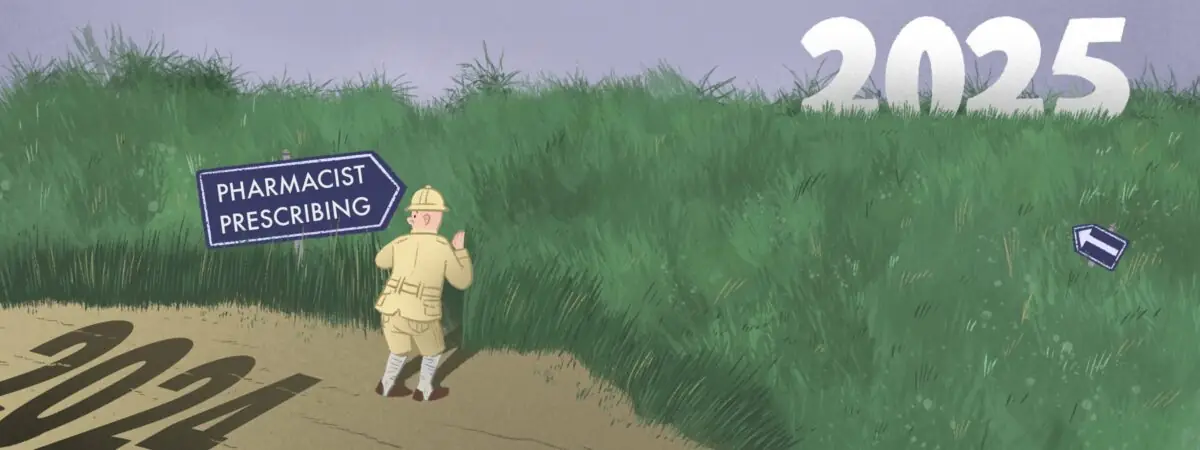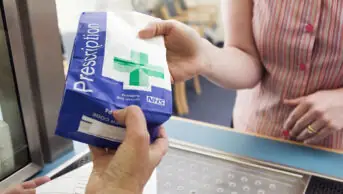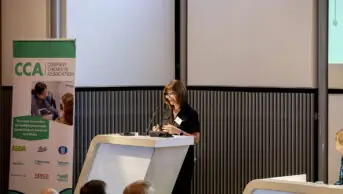It has been almost 18 months since the Independent Prescribing (IP) Pathfinder Programme for community pharmacies in England was first revealed by The Pharmaceutical Journal, but the first prescription under the service is yet to be written.
The programme — which will be the first to nationally fund pharmacists to use their independent prescribing qualification — was highly anticipated following the news that, from 2026, all newly qualified pharmacists would become prescribers from the point of registration.
“Pharmacist independent prescribing is a potential game-changer and needs to become commonplace in community pharmacies,” said Gareth Jones, director of corporate affairs at the National Pharmacy Association (NPA), when the programme was first revealed.
Bruce Warner, former deputy chief pharmaceutical officer for England, had said that ‘pathfinder’ sites, which will trial the prescribing service, would start from January 2023.
However, in January 2023, NHS England said timescales for the programme were being extended, and in October 2023, a spokesperson for NHS England told The Pharmaceutical Journal that each integrated care board (ICB) was expected to have finalised their plans for pathfinder pilots in their area by November 2023.
As of March 2024, no sites had begun prescribing under the programme, but Anne Joshua, interim deputy director of pharmacy commissioning at NHS England, confirmed in an NHS England webinar on 7 March 2024 that all ICBs had signed memorandums of understanding — an agreement to participate in the pathfinder programme in their areas.
Joshua added that NHS England hoped to “have pharmacies live soon”.
In the meantime, here is everything we know so far about how the pathfinder programme will work on the ground.
What is the Independent Prescribing Pathfinder Programme?
Community pharmacists at pilot sites, referred to as ‘pathfinders’, will be able to prescribe as part of locally-commissioned — but nationally funded — clinical services.
The programme aims to explore how community pharmacists can deliver independent prescribing across all regions in England, ahead of establishing a national commissioning framework for the service, which was timetabled for March 2024.
Similar pharmacist prescribing services have already been running in Wales and Scotland since 2016 and 2020, respectively.
The roll out of an IP service in England comes ahead of plans for all newly qualified pharmacists to become independent prescribers at the point of registration from 2026.
“It is important in terms of how we prepare for that moment,” said Webb when the programme was announced.
How many pharmacies will be offering a prescribing service?
NHS England says that it can fund up to 210 community pharmacy sites across the 42 ICBs in the pathfinder programme.
The allocation of the number of sites in each ICB is based on the proposed prescribing models, geography and population, and how the ICB proposes to support the sites.
In the March 2024 webinar, Joshua said that 164 of a potential 210 pathfinder sites had registered for the programme as of 29 February 2024.
What prescribing services will community pharmacies offer through the pathfinder programme?
According to a letter sent from NHS England to ICBs in August 2023, it worked with regional teams to agree on models for the pathfinder programme, based on expressions of interest submitted by ICBs.
It concluded that the programme should evaluate new prescribing services in community pharmacy that fall into three broad categories:
- Prescribing as part of existing NHS services commissioned from community pharmacies, such as the NHS Community Pharmacist Consultation Service (CPCS), the NHS Community Pharmacy Contraception Service and the upcoming common conditions service;
- Prescribing for long-term conditions, such as prescribing statins or anticoagulants for cardiovascular disease, or prescribing rescue therapy for respiratory disease;
- Prescribing as part of bespoke novel services, such as reducing overprescribing for patients on repeat prescriptions for multiple medicines, reviewing antidepressants and menopause services.
In the webinar held on 7 March 2024, Joshua revealed that the most common prescribing service in the scheme would be for minor ailments, and it would be offered at 93 pathfinder sites.
She provided a graph that showed that the next most common area would be hypertension, with prescribing services provided at 73 sites, followed by respiratory services and cardiovascular disease prevention services (including lipids), which would each be offered by 23 sites.
The remaining sites will offer prescribing services for contraception (20); dermatology (12); prescription management (11); women’s health (10); deprescribing (8); depression (8); anticoagulation (5); sexual health (3); and health inequalities (3).
Local pharmaceutical committees (LPCs) have told The Pharmaceutical Journal what services they expect their pharmacies to offer (see Figure).
What funding will pharmacies get for prescribing?
NHS England has said that pharmacies will receive remuneration through the Pharmacy Integration Fund (PhIF) for taking part in the pathfinder programme.
According to the letter sent to ICBs, an overall budget of up to £12m will be allocated to the programme, with a portion of the funding available to pharmacies involved in its delivery.
Pathfinder sites will be able to claim for set-up costs, including support to enable IT for prescribing activity, participation in evaluation and operational readiness.
In the NHS England webinar, Joshua said pharmacies could claim a core fee of £1,500 plus an additional set-up fee around £490 depending on service model.
Pharmacists will also be able to claim for sessional time when prescribing, of up to 6 sessions per week or 24 sessions per month, which can be used over a working day or half day.
Joshua said: “The sessional time is not meant to be 100% patient facing and it can very much be related to set up, working on these networks and also working with practices and, importantly, establishing those relationships.”
Prescribing pharmacists will be expected to participate in mentoring, peer networks and national communities of practice set up by the programme, she said. Time spent on these activities can be met in the sessional time.
No additional funding will be made available for medicines costs, which will continue to be funded from existing ICB allocations as usual.
A spokesperson for the National Pharmacy Association (NPA) said that a figure of £49 an hour for services was “widely circulating among contractors and LPCs”.
Where the prescribing pathfinder service adds to a nationally-commissioned advanced service, such as prescribing following a CPCS consultation, the CPCS service fee could then be claimed by the contractor, in addition to any prescribing fees.
However, where the prescribing pathfinder service is used instead of an advanced service, such as prescribing contraception, rather than supplying it through the patient group direction used for the NHS contraception service, it would not be possible for pharmacists to claim the advanced service fee.
What have pharmacy leaders said about the amount of funding available?
Jones said the funding was “unviable” and “fails to take into account the total cost to the pharmacy, which includes staffing and the opportunity cost of an occupied consultation room”.
James Wood, director of membership and local pharmaceutical committee (LPC) support at Community Pharmacy England (CPE), said: “The pathfinder sites will be commissioned under local enhanced service arrangements, so LPCs will need to be consulted on the service level agreement and pricing.
We want to see the pathfinder programme succeed, as it is likely to inform negotiations on the Community Pharmacy Contractual Framework in the next few years
James Wood, director of membership and local pharmaceutical committee support at Community Pharmacy England
“We will be supporting LPCs to work with the local NHS. We want to see the pathfinder programme succeed, as it is likely to inform negotiations on the Community Pharmacy Contractual Framework in the next few years. This is an important step as the sector prepares for 2026, when all pharmacists will be able to independently prescribe at registration.”
What other concerns do local pharmaceutical committees have about the programme?
Amit Patel, chief executive officer of Croydon LPC, told The Pharmaceutical Journal that he did not support the pathfinder programme because “the current level of resource is unsafe and has not been negotiated at any level”.
He said that the proposed funding of £49 per hour had been based on the cost of employing a locum but did not account for additional tasks needed to run the service, such as administration and management.
In addition to the funding, Raj Matharu, chair of Community Pharmacy London and chief officer of Bexley, Bromley and Greenwich LPC, said the proposed IT system “raised significant risks” and that more interoperable solutions should be explored.
In a letter to The Pharmaceutical Journal, he wrote that the funding did not allow for specialist IP insurance and that there would be opportunity costs for pharmacies with limited consulting rooms.
He added: “While labelled as a locally enhanced service, the community pharmacy IP pathfinder service is, in reality, nationally specified.”
What IT will be needed to provide the service?
IT provider Cleo Systems will host the electronic prescribing system that will be used by pharmacies participating in the pilot.
A spokesperson for Cleo Systems told The Pharmaceutical Journal in February 2024 that the company was “working closely with NHS England to plan the pathfinder programme and aim for implementation from spring 2024”.
Stephen Noble, chief executive of Community Pharmacy Dudley, said he had been told that the IT system would be ready in “late spring/early summer”.
Pharmacists will also be given access to GP records through the GP Connect system. At a roundtable hosted by The Pharmaceutical Journal in July 2023, Joshua said the GP-held record “will give the best clinical assurance around activity related to long-term condition support”.
Access to GP Connect will also enable pharmacists to input information directly into the GP record after completing a consultation.
However, pharmacist access to GP Connect has been delayed. The system was expected to be available for the launch of Pharmacy First at the end of January 2024, but a statement published by Community Pharmacy England just before Pharmacy First went live said that access to GP Connect was not expected until “within a few weeks of launch” of Pharmacy First.
Speaking at the NHS England webinar, Wasim Baqir, senior pharmacist for the pharmacy integration programme at NHS England, said that NHS England was asking ICBs to examine options to allow pathfinder sites to access local pathology records. He added that NHS England was consulting with pathology services about the available options.
What are GPs saying about the programme?
Kamila Hawthorne, chair of the Royal College of General Practitioners, told The Pharmaceutical Journal that GPs were supportive of pharmacists taking on a greater share of patient care to help improve patients’ experience.
“The introduction of independent prescribing offers a number of opportunities for general practice and for patients, and we are pleased to see a comprehensive approach being taken to its design that includes pharmacies right across England,” she said.
If patients are being encouraged to contact their pharmacies for care, there will need to be wide-reaching investment
Kamila Hawthorne, chair of the Royal College of General Practitioners
However, she added that expansion of prescribing rights for pharmacists “needs to be part of a comprehensive and developed plan, which aims to strengthen all primary care”, including appropriate levels of funding and measures to address the “longstanding workforce and workload issues in pharmacy” and support the delivery of increased patient care.
“If patients are being encouraged to contact their pharmacies for care, there will need to be wide-reaching investment to ensure there is sufficient space for consultations, for patients to take clinical tests hygienically — with access to washing facilities — and to receive confidential advice,” Hawthorne said. “The government must also, as a priority, deliver the infrastructure for a single patient record across primary care, to ensure joined-up care between pharmacy and general practice.”
She added that prescribing pathways need to coordinate with the services that GPs provide and there will need to be “comprehensive training” for pharmacists in patient self-care education, minor ailments advice and how to prevent over-prescribing.
How long will the pathfinder programme last?
Initial plans, set out in September 2022, suggested that the pathfinder programme would run until March 2024, and would be followed by an evaluation of the pilot.
While no update has been given on a new end date for the pilot, NHS England’s contract with the University of Manchester for an evaluation of the pilot is due to end on 12 December 2024. By the end of the contract period, the university is expected to have produced a report that describes what has been delivered under the pathfinder programme, including: the number of sessions held; the number of patients seen; the number of prescriptions issued; and the impact on health inequalities.
The university will also be expected to assess the future viability of independent prescribing in community pharmacy and develop recommendations for the service going forward.
1 comment
You must be logged in to post a comment.




I am writing this as a former contractor of 28 years and community pharmacist for over 40 years.
My first comment is to the RPS.
How can you be writing about a proposed pilot service that is supposed to be being reviewed now and evaluated that has not even begun?
Why are you, the GPhC, the NPA and PSNC not screaming from the rooftops that the existing contract and drug tariff is killing the community pharmacy goose that for decades has laid the golden eggs of holding down the cost of NHS prescribing.
Community Pharmacy(CP) maintained their full services plus meagrely funded additional delivery services throughout Covid.
How were they rewarded?
And now when they are constantly faced with shortages and drugs priced way above tariff what are you doing to help?
As the representative bodies of this undervalued heroic group you should hang your heads in shame.
Linda Beech RPS 72365 GPhC 2025050